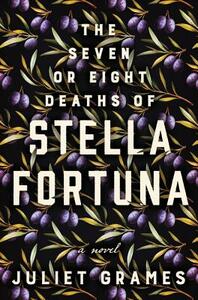Take a photo of a barcode or cover
adventurous
challenging
dark
emotional
funny
informative
medium-paced
Plot or Character Driven:
A mix
Strong character development:
Yes
Loveable characters:
Yes
A million stars! I am so glad that Juliet Grames wrote this story. Stories like Stella's don't often get told, yet she is so relatable. How many of us were afraid, as girls, of sex, marriage, pregnancy, giving birth, growing up? How many of us weren't taught how to find pleasure or advocate for ourselves? How many were forced to simply give up their sense of self and conform to the life-plan that society dictated to them? How many stumbled through life in a dull haze of exhaustion? And as the years go by, people die and people are born and generations come and go. We work every day and look back and miss the stolen moments we had with our mothers and sisters, in nature. I felt very emotional at the end of the book and I'm like Stella, not prone to tears. I also greatly appreciate the insight into southern Italian life, emigration, and life as new Italian-Americans. While, not prone to tears, I am prone to nostalgia and I miss places I've never been and people I only know through my mom, grandma, etc. I feel stories like this bring me closer to them.
Five stars aren't enough.
I couldn't put this down.
Rich character plots, flowing story.
I couldn't put this down.
Rich character plots, flowing story.
Marvelously told mostly tragic tale...as all good family stories can be.
dark
emotional
reflective
sad
medium-paced
Plot or Character Driven:
A mix
Strong character development:
Yes
Loveable characters:
Complicated
Diverse cast of characters:
No
Flaws of characters a main focus:
Yes
Wonderfully written and introspective, but has several jarring sexual assault scenes, so reader beware.
Was not expecting to get sucked into this book and it hit as hard as it did. A heartbreaking read about a strong ass woman growing up at the wrong time.
I had initially picked this book up like a year ago and had read just the introduction. It was slow to begin so it took me quite a while to want to get back into it. I had gone into this book thinking it was a biography of the writer's grandma, but as bad events kept piling up I realized there's almost no way this could be all true and looked it up. Once I had learned that this was a work of fiction the appeal of the book was a little lost on me. I enjoyed the beginning of the book recounting Stella's childhood in Italy and even the telling of how her family got to America because it all felt very realistic for the time. Once it jumped to her adulthood the story telling became jumbled and not super linear. It started to feel like there was no point to the story anymore other than to show she has a miserable life. The beginning of the book felt very clear that it wanted to show what life was like growing up in southern Italy during the war. It almost felt like the author just putting in terrible events so the book could move forward and lost the story she was trying to tell.
I really liked this book until the end. The last of the deaths is truly the death we all fear, that of being forgotten, our stories not being told waiting for someone to make us relevant again.
I enjoy the story of how I came to read this book the best.
Find a friend that you can text or call and ask them what you should read over the summer...while you are waiting for their reply roam around the bookstore...roam more after they give you a list of books.
Read the book that they say has a beautiful cover that reminds them of the relationship that you have with your daughter...pick that book because you love the reason, you love that they notice and, well, you love them and value their opinion. Lather, rinse, repeat...this is book #1 of 3...I look forward to the 2023 suggestion.
I enjoy the story of how I came to read this book the best.
Find a friend that you can text or call and ask them what you should read over the summer...while you are waiting for their reply roam around the bookstore...roam more after they give you a list of books.
Read the book that they say has a beautiful cover that reminds them of the relationship that you have with your daughter...pick that book because you love the reason, you love that they notice and, well, you love them and value their opinion. Lather, rinse, repeat...this is book #1 of 3...I look forward to the 2023 suggestion.
It felt both too visceral and like a slog at the same time. Enjoyable for a large part but definitely not for me.
I’m confused mostly. It wasn’t until reading the author’s notes (those notes came after the story) that I found out Stella Fortuna isn’t an actual, real person. I enjoyed this fascinating family saga, but some parts were hard to pass, unless they were non-fictional, true stories. I am kind of digesting this information now, but I can already state that I'm a teeny tiny disappointed, while I do understand why the author needed to adapt their family history into fiction.
Stella Fortuna's life spans almost a century and against all odds, she's still alive today. Her childhood has been full of incidents and when the Fortuna family emigrate to America, the strong willed Stella still can't outlive faith, nor patriarchy.
The author puts themselves into the story, sometimes to raise suspense, lifting the veil for what's to come, sometimes to clarify and to guide the readers through the story. Most of the times the story felt like it was told from a reporter's perspective, like the author had done research, held interviews, and collected data to get the bigger picture. I really liked that - and it's probably why I thought this was a non-fictional story. But The Seven or Eight Deaths of Stella Fortuna is partly told as a novel as well, and some events were therefore described with emotions and details - that I thought were too subjective for a family-member-in-the-role-as-a-reporter. Knowing now that this story is fictionalized solved this issue, but created another one for me. This book touches - among other things - on abuse, assault, and incest. It is admirable that the author didn't shy away from these painful topics, but it felt like the author addressed them only because they didn't want to deny that part of history. They now kind of felt like stand-alone, unrelated events, reported and then left without a follow-up, like a loose thread. While reading I thought: Oh, okay... well... the author can't help this happened in their family, what a move to mention it here, exposing people (and maybe invading the victim's privacy). Since this book should be read as fiction, it definitely needed to be integrated more to justify their mentions.
I am still confused to be honest. Was it a novel? A memoir? Oral history in book-form? I really can't tell. All I know is that I enjoyed reading it anyway.
Stella Fortuna's life spans almost a century and against all odds, she's still alive today. Her childhood has been full of incidents and when the Fortuna family emigrate to America, the strong willed Stella still can't outlive faith, nor patriarchy.
The author puts themselves into the story, sometimes to raise suspense, lifting the veil for what's to come, sometimes to clarify and to guide the readers through the story. Most of the times the story felt like it was told from a reporter's perspective, like the author had done research, held interviews, and collected data to get the bigger picture. I really liked that - and it's probably why I thought this was a non-fictional story. But The Seven or Eight Deaths of Stella Fortuna is partly told as a novel as well, and some events were therefore described with emotions and details - that I thought were too subjective for a family-member-in-the-role-as-a-reporter. Knowing now that this story is fictionalized solved this issue, but created another one for me. This book touches - among other things - on abuse, assault, and incest. It is admirable that the author didn't shy away from these painful topics, but it felt like the author addressed them only because they didn't want to deny that part of history. They now kind of felt like stand-alone, unrelated events, reported and then left without a follow-up, like a loose thread. While reading I thought: Oh, okay... well... the author can't help this happened in their family, what a move to mention it here, exposing people (and maybe invading the victim's privacy). Since this book should be read as fiction, it definitely needed to be integrated more to justify their mentions.
I am still confused to be honest. Was it a novel? A memoir? Oral history in book-form? I really can't tell. All I know is that I enjoyed reading it anyway.




